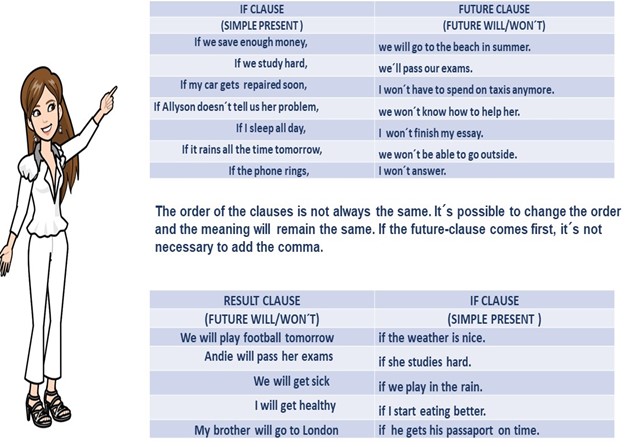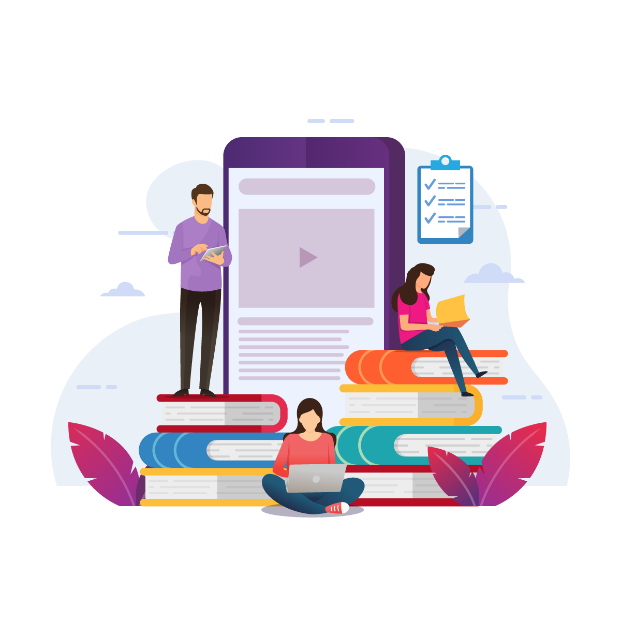I. WHEN DO WE USE FIRST CONDITIONAL CLAUSES?
The first conditional is used to talk about possible results or possible situations in the future. We describe something that is likely to happen. It mentions things that will happen in the future if a condition is met. For instance:
- If we leave now, we will get to the airport on time.
- If it gets cold and you don´t wear a sweater, you will get sick.
- If you eat well, you will get healthy.
- If it doesn´t rain tomorrow, we´ll go camping.
If clauses are used to show a relationship between two events in AFFIRMATIVE or in NEGATIVE forms. Notice that you always need to add a comma if you begin your sentence with an if-clause. Analyze these examples:

II. SOMETHING TO KEEP IN MIND
You can mix the affirmative and negative forms in the phrases as long as the sentence meaning is logical and correct. Look at these examples:
- If my mother doesn´t go to the doctor, she won´t get better.
- If what I cook tastes horrible, I won´t eat it.
- If my taxi doesn´t come soon, I won´t arrive on time.
- If they don´t come to work on time, they won´t be promoted.
Lastly, a first conditional sentence is formed by two dependant sentences or phrases; this means that one cannot exist without the other. In first conditional sentences, it is necessary to include an if-clause and a future-clause in order to have a sentence with meaning. For instance:
If I speak English correctly, I will be able to find a better job.
“If I speak English correctly” - shows a condition that requires a result.
“I will be able to find a better job”, indicates the possibility to complete the first action in the first part of the sentence.
III. FIRST CONDITIONAL + MODAL VERBS
In first conditional sentences it is possible to use a modal verb on the future-clause such as:
- can/ can´t
- must/musn´t
- may
- might/ might not.
Can is used to indicate ability or possibility
- If you arrive on time, you can finish early.
- My sister can help you with your homework if you ask her nicely.
- Mom, can you look after my dog if I go out of the city?
Must is used to show a strong obligation.
- If you visit Paris, you must go to Louvre Museum.
- You mustn´t go to that art exhibition if you don´t want to.
- You must pay your rent if you want to avoid legal trouble.
May is used to talk about permission.
-
- Miss, if I finish my work early, may I go home?
- I may help you to study if you promise to do your best.
- If I get a good grade on my IELTS Exam, I may study abroad next year.
Might is used to talk about a remote possibility.
-
- I might catch the bus if I leave now.
- You might get sick If you don´t stop going to bed so late.
- If my sister buys a house, she might allow me to live with her.
IV. CONSOLIDATION.
V. EXERCISE I.
VI. READING TEXT.
READING COMPREHENSION AND VOCABULARY BUILDING

PRINTED BOOKS VS E-BOOKS?
Globalization and the improvement of technological tools and devices have made the practice of reading be modified in many ways, which goes from the way we acquire reading material to the presentation of those resources.
E-BOOKS
At present it is way easier to buy a book if you have a cellphone, a tablet or a computer. You will be able to purchase one with just a click and enough money on your credit or debit card.
If you purchase an e-book, for instance, you have the added value to be able to take it with you anywhere, more easily. It is inside your smart device and it can be available whenever you need it. You will be able to carry as many e-books as you wish. This can be incredibly useful, especially if you are traveling.
Another benefit is that if you want to take notes, you can do it without the need of a pencil or pen; smart devices have many tools to do it. E- books are also suitable resources for people with low-vision problems. This kind of books have the option to zoom or increase the letter size; If someone has problems reading small font sizes, this can be an exceedingly useful tool. Nowadays, the so popular audio books have been increasing their sales rates. People with a medical condition for whom it is impossible to read, can use this option to enjoy their favorite books.
Another advantage of preferring e-books rather than printed books is the great variety of topics and formats, such as magazines, comic books, newspapers that you can download. If you are the type of person who always searches for your favorite magazines at the stores and feel disappointed when you discovered they have run out or that they weren’t delivered on time, e-books can be the solution to that problem. You can subscribe to the magazine or newspaper page and you will receive the issue each week or month.
E- books are also easier to get, even the weirdest titles. If you don´t have the time or availability to go from library to library in search of a book you want, you will find that e-book stores are amazingly wide and count on as many titles and genres as you wish. Also, because of our current pandemic situation, many libraries have opened their online pages for people to purchase books from their libraries, having even more variety of titles to choose from around the world.
Prices in the e-market are also much lower. If we compare the shipping price of printed books, even in your own country, the difference is quite significant. This is important, considering the fact that sometimes the purchase comes from abroad. Also, e-books will be a lot easier to find in other languages.
PRINTED BOOKS
Printed books, on the other hand, are also important resources and offer several advantages. One of them is that conventional books will never run out of battery or stop functioning for any reason. If you are the kind of person who hates to carry a backup battery, then printed books will be the best option for you. Also, not all books are digitalized, many titles are only found in printing versions. This situation also involves the uniqueness of the book. If you are trying to find an infrequent title, it will also imply a great satisfaction when you find it. There are people, who enjoy the smell or even the sensation of a printed book. These simple actions can give satisfaction to the reader making the process of acquisition more enjoyable.
Printed books also carry an emotional attachment to old days and old habits. If you are an eager reader, you will find an enormous amount of satisfaction in building your own library with your favorite books. People around the world have the hobby of collecting books and putting a great effort to get the special edition or even special material for the book they want. This represents an achievement for them and brings happiness to them.
Whatever kind of book you decide to purchase, you will choose the option that best suits your lifestyle or reading preferences. What is important, above all, is to keep the delight of reading alive, regardless of the way you do it.
VII. PRACTICE I.
VIII. BIBLIOGRAPHY
Azar, B. S., Azar, D.A., & Koch R.S. (2009). Understanding and Using English Grammar. Longman.
Barker C. and Mitchell, L. (2004). Mega 1 (First Ed.). Macmillan Publishers.
Hewings, M. (2013) Advanced Grammar in Use with Answers: A Self-Study Reference and Practice Book for Advanced Learners of English. Cambridge
University Press.
Murphy, R. (2012). English Grammar in Use. Ernst Klett Sprachen.
Murray, L. (2014) English Grammar. Cambridge University Press.
IX. WEB RESOURCES.
Images_Compra propia de licencias de banco de imágenes de Pixton y Pngtree, exentas de derechos de autor. https://www-es.pixton.com/ & https://es.pngtree.com/free-backgrounds.Reading Text- own elaboration.
X. CREDITS
- All practice exercises and charts were written by Karla Shareni Murillo Granados_2022_ENES- LEÓN-UNAM
- Audio version performed by Kimberly, Isabella, John and Matt_Compra propia de licencia de uso de voces en Voicemaker, exenta de derechos de autor. https://voicemaker.in/ _Connie Reyes Cruz_2022_